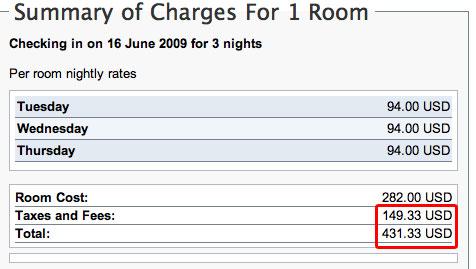
 It’s all fun and games until the federal government gets involved.
It’s all fun and games until the federal government gets involved.
That lesson was abruptly brought home to several major hotel chains, sports facilities, convention centers and management companies who last year, ran afoul of the Federal Communications Commission after fed-up consumers complained about being unable to access wi-fi without paying exorbitant rates.
Now, it’s time for the Federal Trade Commission to take on hotel operators over hidden costs imposed upon guests, known in the trade as ‘resort fees.’
The FTC has warned 22 hotel operators that their online reservation sites may violate the law by providing a deceptively low estimate of what consumers can expect to pay for their hotel rooms. Warning letters, published on the FTC site, cited consumer complaints that surfaced at a recent conference the FTC held on “drip pricing,” a pricing technique in which firms advertise only part of a product’s price and reveal other charges as the customer goes through the buying process.
According to the FTC letters, “One common complaint consumers raised involved mandatory fees hotels charge for amenities such as newspapers, use of onsite exercise or pool facilities, or internet access, sometimes referred to as ‘resort fees.’”
Mandatory fees, the FTC noted, could be as high as $30 per night, “a sum that could certainly affect consumer purchasing decisions.” (As a side note, the Washington Post found that some hotel fees could be as high as $50, and a few in the $100 range.)
The warning letters from the FTC also state that consumers often did not know they would be required to pay resort fees in addition to the quoted hotel rate. Many visitors, it added, learned only upon check-out.
An article in Meetings & Conventions stated that in 2015, U.S. hotels were projected to make a record $2.47 billion from all fees and surcharges, according to a study by New York University's Tisch Center for Hospitality and Tourism.
Reuters noted that more U.S. hotels - particularly in Florida, California, Hawaii and Nevada - are charging resort fees, according to a study by Travelers United. The consumer group found that 1,671 hotels and lodging sites in the U.S. charged resort fees, but did not include them in the nightly rate advertised online.
FTC chairperson Edith Ramirez has called for new federal legislation to combat the hotel industry's imposition of hidden resort fees, according to the Los Angeles Times. In a recent letter to 10 U.S. congressional representatives, Ramirez called the charges a “deceptive and unfair trade practice” and suggested it was time for Congress to prohibit such fees.
It’s an issue that has been building for years. Fueled by consumer complaints, FTC investigations have taken place multiple times. For example, according to the Milwaukee Journal-Sentinel, The FTC issued a warning to 22 hotels in 2012, saying that surprising guests with resort fees was deceptive and illegal.
In response, the hotels began to list their resort fees on their booking websites — often in small print. But the FTC didn't require that hotels add the fee into the rate that is advertised on travel websites and elsewhere.
Now, it seems, the agency has had a change of heart.
“Consumers are entitled to know in advance the total cost of their hotel stays,” said Federal Trade Commission Chairman Jon Leibowitz. “So-called ‘drip pricing’ charges, sometimes portrayed as ‘convenience’ or ‘service’ fees, are anything but convenient, and businesses that hide them are doing a huge disservice to American consumers.”
Extra fees have long been a bone of contention in the travel industry. In the case of airlines, the Transportation Department ordered carriers and travel agents to include all mandatory fees and taxes in the advertised price of airfares.

